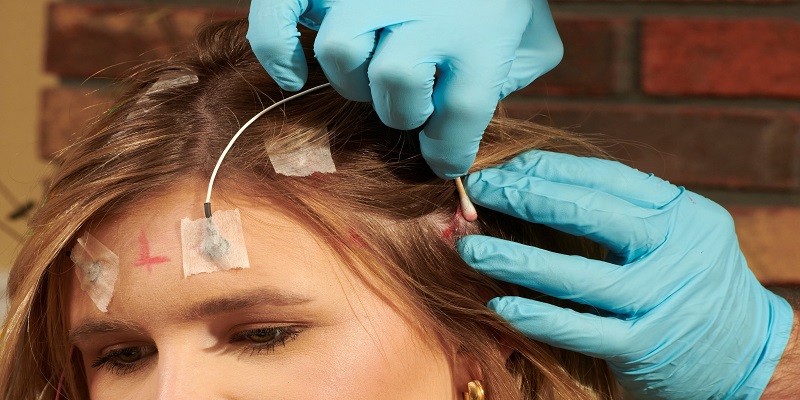Last Updated on June 18, 2025
To remove electrode glue from hair, the first step is to apply a generous amount of oil such as coconut or baby oil onto the affected area. Rub it in gently and let sit for 5-10 minutes. After that, use your fingertips to massage the oil into the scalp and loosen up any hardened glue residue.
Next, using a comb with fine teeth, work through the hair carefully until all of the glue has been removed. If needed, repeat this process for stubborn patches of residue. Once you have finished removing all of the glue from your hair rinse out all traces with warm water and shampoo as normal.
Finally, make sure to condition thoroughly afterwards in order to replenish any lost moisture or nutrients due to contact with oils or glues during removal.
- Wet the hair with warm water: Start by wetting your hair with some warm water as this will help to soften the glue and make it easier to remove.
- Apply a conditioning oil: Use an oil such as coconut or olive oil and massage it into your scalp and hair, focusing on areas where the electrode glue is present. Leave for 5-10 minutes so that the oil can penetrate through any remaining glue residue in order to break it down further.
- Shampoo your hair: After you have left the conditioning oil on for a few minutes, shampoo your hair thoroughly using lukewarm water until all of the oils are rinsed away completely.
- Remove excess residue with a soft cloth or brush: Once you have washed out all of the oils from your hair, use a soft cloth or brush to gently scrub at any remaining pieces of electrode glue until they come free from your locks entirely – be sure not to pull too hard!
- Rinse again if necessary: If there is still some residual adhesive left after brushing then rinse one more time with lukewarm water before drying off as normal.
How to Remove Medical Glue from Hair?
Removing medical glue from hair can be a tricky process, but there are some steps you can take to make it easier. Start by wetting the area of your hair that is covered in the glue with warm water and gently working out any clumps. You may need to repeat this until all of the glue has been loosened up.
Once most of the glue has been worked out, use baby oil or olive oil to help remove any remaining residue and then shampoo as usual. If all else fails, seek professional advice as they will have access to more powerful products that may be better suited for removing medical grade glues.

Credit: lifelinesneuro.com
What Dissolves Eeg Glue?
EEG glue, also known as paste or gel, is used to attach EEG electrodes to the scalp and can be a tricky substance to remove. So what dissolves EEG glue? The most commonly used solvent for removing EEG glue is 70-90% rubbing alcohol.
Rubbing alcohol will quickly dissolve the adhesive material, allowing you to easily remove it from your skin or hair without damaging the underlying tissue. Additionally, some health care professionals recommend using products like baby oil or olive oil as an alternative to rubbing alcohol for more sensitive areas of skin. To use either product simply apply a small amount directly onto the affected area and wait five minutes before attempting removal of any remaining residue with moistened cotton balls or gauze pads.
What Dissolves Surgical Glue in Hair?
Surgical glue is a type of adhesive that is used to close wounds or incisions after surgery. In some cases, it can be difficult to remove the surgical glue from hair when it has been applied. While there are professional products available for use in removing this type of adhesive, there are also several home remedies that may help dissolve the surgical glue from your hair.
The most commonly recommended method involves using a combination of water and baby oil. Simply apply a generous amount of baby oil to your hair and let it sit for 10-15 minutes before rinsing with warm water. Another option is to rub olive oil into the affected area on your head and let it sit overnight before shampooing out the next day.
If these methods do not work, you could try using an acetone-based nail polish remover although this should only be done as a last resort since acetone can be damaging to both skin and hair if too much exposure occurs.
Will Surgical Glue Come Out of Hair?
Surgical glue is an effective tool in many medical procedures, but it can be a nuisance if some of it gets stuck in your hair. If you’re wondering whether surgical glue will come out of your locks on its own or with the help of home remedies, the answer is maybe. Depending on the type and amount of glue used, as well as how long it has been in your hair, there are various methods to try that may help remove the adhesive.
Some people have had success using common household items like olive oil or peanut butter to loosen up and dissolve surgical glue from their strands while others suggest rubbing alcohol or nail polish remover for more stubborn adhesives. It’s also possible to try professional treatments such as a deep conditioner or clarifying shampoo designed specifically for removing residue from hair products. Ultimately, only experimentation will tell what method works best for you and getting rid of any residual adhesive left over from surgery should hopefully be easier than ever with these helpful tips!
How Do You Remove Sleep Study Glue from Hair?
Removing sleep study glue from your hair can be a daunting task, but it’s not impossible. The best way to remove sleep study glue is to start by dampening the area with warm water and using a mild shampoo or conditioner. Massage the affected area gently with your fingertips in order to loosen up any remaining glue that might still be sticking onto the strands of your hair.
You may also want to try using an oil-based product such as coconut or olive oil, which can help dissolve stubborn residue without having to pull out chunks of hair in frustration. Once you have loosened up all of the adhesive, use a wide-toothed comb or brush through your wet hair until all of the glue has been removed completely. Be sure to rinse thoroughly afterwards!
If you find yourself facing this issue more often than desired, you may want to consider investing in some specialized products that are specifically designed for removing medical adhesives like those used during sleep studies – these special gels and creams will make removal much easier and less painful!
5 Steps to Removing EEG Glue from Hair
Conclusion
Removing electrode glue from hair can be difficult and time consuming. However, if you follow the steps outlined in this article and invest in some specialized products, you will be able to get rid of any electrode glue residue quickly and effectively. It is important to take extra care when removing the adhesive so that it does not cause further damage to your scalp or strands.
With some patience, perseverance, and a few helpful tips, you can easily remove any leftover residue without causing more harm than good.


